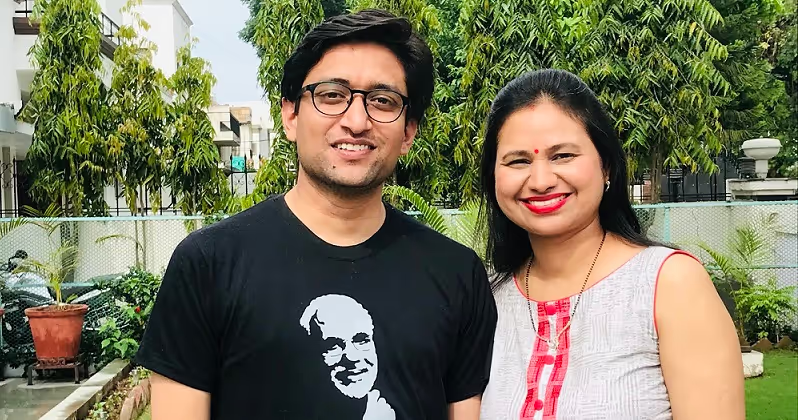[Startup Bharat] NaMo or RaGa? As India votes, Chandigarh-based BePolitical lets you wear your politics
Chandigarh-based bootstrapped startup BePolitical is bringing a quirky new category to ecommerce by blending fashion with politics in its affordable T-shirts. Next up are cricket-specific designs in time for the ICC World Cup.
Politics makes strange bedfellows, it’s true, but in the startup world, it’s leading to some quirky offerings. As the world’s largest democracy heads for general elections, Chandigarh-based ecommerce startup BePolitical makes it possible to wear your politics on your sleeve with its unusual merchandise.

Ekta and Tushar Jain, the Co-founders of BePolitical.
Launched by husband-wife duo Ekta and Tushar Jain in January 2019, BePolitical is a “100 percent politically neutral brand” that provides quirkily designed T-shirts on various political parties.
Bootstrapped with the founders’ savings of Rs 1.5 lakh, the company has already sold more than 600 T-shirts online in three months, and is tying up with local retailers for an offline presence too.
The eureka moment
An engineer and MBA graduate, Tushar (34) has 10 years of experience working with McKinsey, HCL, and Jugnoo. As head of marketing at Jugnoo, Tushar loved the learning curve and the independence the setup provided. Later, he worked in marketing at a growing IT company (Kays Harbor Technologies) in Chandigarh.
Despite working at full-time jobs, Tushar was involved in few entrepreneurial activities simultaneously. He had co-founded Preper, an online platform for RBI exam preparation, but it had to be wrapped up due to lack of time that the business demanded.
In October 2018, however, entrepreneurship came calling again. Tushar stumbled upon an article on YourStory regarding a bootstrapped venture selling T-shirts for Narendra Modi’s 2014 campaign.
“That kept me thinking that if it could work for PM Modi, why couldn’t it work for other politicians. After all, India is a land of elections with famous personalities at both national and local level,” Tushar recounts.
The existing players (the most popular being the NaMo app) are all politically aligned; there is no single platform with merchandise on multiple parties.
That was his ‘eureka’ moment - why not start a 100 percent neutral political merchandise store that caters to all (or majority) political thoughts?
He decided to start up with his partner, Ekta. The couple was clear that they had a financial cushion and could return to full-time jobs in case things didn’t pan out.
Also read: Meet the women entrepreneurs who are tapping AI to revolutionise fashion ecommerce
Testing the waters
In the Western countries, quirky and often even absurd political merchandising is common. In the US, Obama cereals were and Trump flipflops are a rage. To test the Indian market, Tushar and Ekta launched a test website in October 2018 to find potential buyers before getting into a production cycle.

Currently, BePolitical is focusing on mainstream national parties.
Tushar elaborates, “To test our hypothesis, after setting up the website, we ran a few Facebook ad campaigns for around a month. We offered users an opportunity to win a free T-shirt. All they had to do was tell us about their most liked politician, along with their contact details and T-shirt size. That helped us in two ways: we had a ready list of probable buyers on day one of our t-shirt launch, and we knew the size distribution/political inclination of our initial audience. This input helped us plan our inventories better.”
Tushar takes care of marketing and vendor management at BePolitical. Ekta leads the designing, printing, and logistics for BePolitical. She is an electronics engineer and has worked for coal-based power plants. Ekta also handles customer interactions for the startup.
A large market
BePolitical officially launched in January and is available on Amazon India in addition to its own website. As a light-hearted, fun-filled brand, its strategy is to create humour in multiple forms (like political memes) and market it through social media. Their designs have an element of humour, giving customers a chance to wear their political opinion, in style and in a lighter vein.
BePolitical is targeting the 22 to 45 age group and from Tier II, III, and IV cities. Tushar claims that most of their orders come from smaller towns and villages (Indergarh in Rajasthan, Tirthahalli in Karnataka, Odlabari in West Bengal, Raghogarh in Madhya Pradesh – to name a few).
The startup at present offers T-shirts for mainstream parties like BJP, Congress, AAP etc. As it scales, BePolitical will come up with regional coverage as well (like that for BJD, TDP, AIADMK etc.).
In a country like India where multiple states, cities, municipalities, panchayats etc. go for elections each year, this can be a recurring revenue stream. (There are nine state elections waiting to happen in 2019, in addition to the general elections.) Also, the middle class in India is now politically more involved and has a clear political alignment and affiliation, and is not afraid to show it on social media.

As they scale, BePolitical plans to offer more designs for regional political parties as well.
Also read: Edtech startup Gradeup’s clientele is 1pc of India’s population. Here’s how they did it
Building from a Tier II town
According to Tushar, the biggest challenge of being based in a Tier II city was finding the right talent, especially in marketing and growth hacking.
“Also, the entrepreneurial ecosystem here is still evolving and you don’t have easy access to mentors or enough opportunities to interact with like-minded people. As we expand, we will shift to Bangalore or Delhi-NCR, depending on our requirement of suppliers/talent/investors,” he tells YourStory.
Another challenge was to identify the right vendor who understood their vision of the brand and manufactured a product matching that brand value. Since neither of the founders is from retail or the garment industry, they lacked knowledge of the manufacturing process (They are now sourcing from Ludhiana). Their software development is 100 percent outsourced.
On the other hand, Chandigarh does not burn a hole in your pocket like metro cities do. The founders’ home maintains BePolitical’s inventory. “The co-working space we work out of is cheap compared to metro cities, as are salary expectations. Although marketing is done mostly digitally, we tie up with local colleges for promotions,” he says.
BePolitical is a team of five people, including an experienced fashion designer. To stay lean, it currently offers minimum choices in terms of product variation.
“This ensures we can be lean with our manufacturing and can control our inventories better. We produce in small lots, resulting in better inventory management and lesser impact on the environment,” Tushar explains.
For this young enterprise, inventory management is done manually as of now. “We currently keep a check on each politician’s popularity to predict inventory. We are maturing for highly predictive analysis. But as of now, the number of designs are kept minimal,” he adds.

Cracking the code of unit economics
BePolitical’s focus is on customer outreach without losing out on profitability. Their T-shirts are priced between Rs 449 and Rs 799. BePolitical’s first customer (outside their friends’ circle) was a paramilitary officer from West Bengal. “He was all praise for the quality,” Tushar recollects, adding that they use premium quality 100 percent cotton and industrial-level screen prints that can withstand more than 50 washes.
The average ticket size is Rs 500, and Tushar maintains that their return rate is less than two percent. Although BePolitical offers discounts quite often, Tushar claims they are not losing money.
“We have been profitable at unit level from day one. There is a strong demand-supply mismatch and we would need capital and external funding to fuel our growth.”
In the first month of operations, Tushar claims BePolitical received more than 100 orders. As political momentum builds up further leading to the general election, they are seeing increased traffic and more than 20 orders per day. They recently partnered with a local political party in Chandigarh to provide T-shirts (in bulk) for their supporters.
“We will focus on such partnerships during the state and municipality elections, as there are only two or three major national parties getting attention during the Lok Sabha elections,” Tushar notes.
BePolitical's growth plans
Having sold more than 600 T-shirts so far, BePolitical is hoping to sell at least 1,000 this month. By the end of the general elections, BePolitical aims to sell around 5,000 units; its target is 20,000 units by end of the year. They will soon launch on Flipkart and Snapdeal as well as in some physical stores in Chandigarh, Bengaluru, and Delhi-NCR. The startup is also exploring Print on Demand (PoD) platforms like MyDreamStore.
Tushar says, “We plan to make BePolitical a marketplace for political merchandise. In fact, we are in talks with few suppliers to list their products on our portal and work in drop-shipping mode.”
The founders have bigger plans – and categories – in mind. With ICC World Cup to be held later this year, BePolitical plans to launch a sports category under a different name (as the name BePolitical won’t fit).
“T-shirts are the most widely accepted article in the merchandise world. Essentially, we are not selling a T-shirt but the design. Our plan is to come out with more whacky and out-of-the-box merchandise that matches our brand value – like wobble heads of famous political personalities. We are starting with fridge magnets soon. We will launch other items like wallpaper and wobble heads, depending on the market demand,” Tushar says.
Also read: Meet the 'Padmen' working for menstrual hygiene with Delhi-based Azah


![[Startup Bharat] NaMo or RaGa? As India votes, Chandigarh-based BePolitical lets you wear your politics](https://images.yourstory.com/cs/2/d6aa0240-2d6a-11e9-aa97-9329348d4c3e/ekta-tushar1555498289979.png?mode=crop&crop=faces&ar=2%3A1&format=auto&w=1920&q=75)




